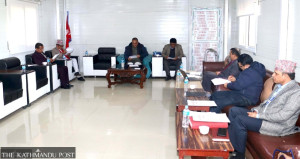Sudurpaschim Province
Three years on, monsoon-displaced people in outlying Bajura settlements await rehabilitation
A total of 519 families have been displaced over the past three years after their homes were destroyed by heavy rains, government data show.
Arjun Shah
Dry landslides have surrounded the Majhbada and Bhaisikhal settlements of Sappata Muktikot in Bajura, a hill district in Sudurpaschim Province. The landslides that started erupting about a decade ago have put the lives of the locals at risk.
In October 2022, landslides triggered by heavy unseasonal rains destroyed 39 houses while some other houses were partially damaged. Since then the 39 families have been taking shelter in their relatives’ houses in the neighbouring settlements while eight impoverished families, mostly Dalits, are still living in their partially-damaged houses for lack of alternatives.
“The villagers run to Mandali Basic School nearby when a cloud hovers in the sky. They stay in the school building until the weather improves,” said Lal Bahadur Rana, the head constable of Nepal Police and in-charge of Muktikot temporary police post.
The displaced victims have time and again put forth their demand for relocation to a safer area but the government authorities are yet to take any concrete steps for their rehabilitation.
Majhbada and Bhaisikhal in ward 1 of Swamikartik Khapar Rural Municipality aren’t the only settlements affected by the landslides. Every year several families are forced to vacate their homes to avoid mishaps. According to the data of the district administration office, a total of 519 families were displaced due to monsoon-induced disasters in Bajura over the past three years.
Datte BK from Sappata Muktikot has been staying at his brother-in-law’s house for the past three years with his children. “The landslide swept away my house and I became homeless. I could have pitched a tent in my field and lived there, but the landslide swept away my field too,” he said. “The government doesn’t care about us.”
Most of the displaced families have been taking shelter in the houses of their relatives and neighbours. Some others are either staying in the animal sheds or under tarpaulin tents. A few families risk their lives in the damaged houses as they have nowhere to go.
The landslides in Muktikot affected several settlements including Gothe Odar, Gunibhir, Banchari Garna, Majhbada and Berma, displacing dozens of families. According to Ajaya BK, the chairman of ward 1 of Swamikartik Khapar, 19 families have left the villages so far while some others are still languishing in temporary huts.
The situation of Badimalika Municipality, which covers the district headquarters Martadi, is also the same. In 2020, floods in the Budhiganga River swept away houses and properties of 14 families in Ghanghar of ward 2 of Badimalika. The flood-displaced families have not been rehabilitated even after three years of the disaster. “A single woman who was displaced by the flood is now taking shelter at a social organisation in Martadi. Some victims have been staying with their relatives while a few families are staying in temporary huts,” said Dambar Mahat, the ward chief of Badimalika-2.
As many as 87 families were rendered homeless in Gaumul Rural Municipality, 128 families in Himali Rural Municipality and seven families in Tribeni Municipality due to water-induced disasters over the past three years.
“We prepared a detailed report of 519 families who were displaced by monsoon-related disasters in the past three years. Process of rebuilding the houses is underway,” said Nayan Rawal, focal person at the district disaster management committee in Bajura.
According to him, the reconstruction of 106 houses in Himali, 103 in Swamikartik Khapar, 100 in Jagannath Rural Municipality, 86 in Budhiganga, 49 in Gaumul, 36 in Badimalika, 32 in Khaptad Chhededaha Rural Municipality and seven in Tribeni has begun by providing housing reconstruction aid to the beneficiaries.
The federal government decided to provide Rs500,000 each to the displaced families to reconstruct their houses in three tranches.
Rawal admits to the delay in reconstructing the houses for the displaced families. “The reconstruction programme has been delayed mainly due to lack of budget. The district disaster management committee is yet to provide the budget required to reconstruct the houses,” he said.
Of the total budget required for the housing reconstruction programme, the federal government should allocate 60 percent, while the provincial and local governments should bear 30 percent and 10 percent respectively.
“The provincial government has not released the budget for the housing reconstruction while the local units provided the budget amounts partially. We; therefore, have not been able to provide the housing aid,” said Rawal.
Sudurpaschim Province government has the responsibility to release a total budget of Rs 77.8 million to Bajura for the housing reconstruction. According to Bishwadeep Besra, undersecretary at the provincial Ministry of Internal Affairs and Law, the Sudurpaschim government allocated only Rs 30 million budget for housing reconstruction in the current fiscal year of 2023-24. “We are preparing to ask for an additional budget from the finance ministry. Efforts are on to send the budget to the respective district within two months,” said Besra.




 18.12°C Kathmandu
18.12°C Kathmandu















